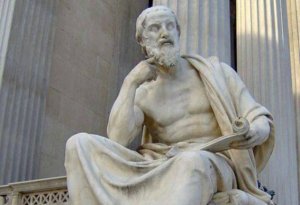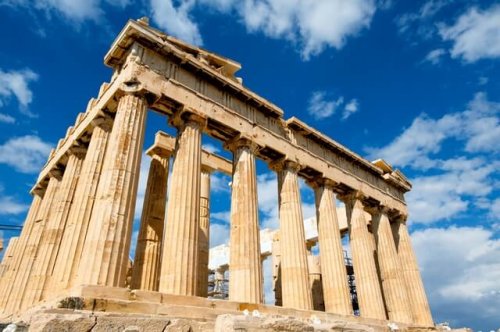Herodotus: The First Historian and Anthropologist

Herodotus of Halicarnassus was a historian and geographer in Ancient Greece. He lived between 484 and 425 BC. Many experts consider him the first historian and anthropologist.
He was the first to leave a reasoned and structured record of human actions and events. In order to accomplish this, he used a wide variety of oral and written historical sources. Herodotus was very ahead of his time. Let’s study his life in greater detail.
Herodotus and history
The nine books of the Histories, his greatest work, had two goals:
- To record the events that both the Greeks and the barbarians experienced.
- To explain the causes of these events and their effects on both the Greek and Persian societies.

The events that Herodotus recorded were centered on the Greco-Persian Wars (492 – 478 BC), where the Greeks and the Persian Empire fought. However, that’s not all he covered, as the Histories sometimes strayed from this main topic.
These events were recorded in prose rather than poetry. Despite the fact that Homer, the narrator of the Illiad and the Odyssey, clearly influenced Herodotus, he didn’t try to adapt his style in these works.
Nevertheless, both narrators had certain things in common. They narrated in the third person and used elevated language.
Another great difference between epic poems and Herodotus’ historiography are the sources he used. While the Muses were Homer’s primary inspiration, Herodotus focused on collecting information.
Herodotus: The traveling historian
Herodotus traveled a great deal. As such, it’s no surprise that he wrote down everything he saw and heard during his journeys. This is clearly reflected in his method of collecting sources. It consisted of the following points:
- Search for and gather information about the things people witnessed. He used descriptions of the geographic characteristics of places. Also, he described the customs of the people he visited as well as their most striking peculiarities.
- When he couldn’t gather information directly, he relied on oral testimonies from the natives of the lands he visited.
- He also used written sources produced by epic poets and logographers.
Herodotus explained in his work how and why he collected the information that he used to describe an event. In fact, he stressed both the importance and difficulty of using various sources to describe a historic event in order to make them as truthful as possible. This use of direct sources, both oral and written, is what made Herodotus’ work legendary. It changed the way people wrote about history.
The 9 books of the Histories
His long work, the Histories, is divided into 9 books:
- In the first book, he covered the possible causes of the Greco-Persian wars. He focused on the reign of Lydia in the times of King Croesus. According to this historian, he incited conflict between the Greeks and Persians.
- The second book is about Egypt and its great marvels. The author described relevant geographical characteristics and the most striking Egyptian customs. He also summarized the country’s long history.
- In the third book, he discussed the reasons that incited Cambyses II to attack Egypt with the aim of conquering it. He also described Cambyses’ personality and military campaign. The book ends with his death and Darius I’s ascension to the throne.
- Book 4 has two parts. The first one is about Scythia (a Central Asian region) and the second is about Libya.
- From the fifth to the ninth book, Herodotus focused on the military conflicts between the Greeks and the Persians in the Greco-Persian Wars. The fifth book covered the Persian advances against the Greeks, specifically in Macedonia and Thrace. It also talked about the history, geography, and culture of Sparta and Athens.
- The sixth book deals with Darius’ expedition, which concluded with a Greek victory at Marathon.
- Book 7 describes a series of dramatic battles, such as the Battle of Thermopylae.
- Finally, the 8th and 9th books describe the battles of Salamis and Plataea, respectively.

The first historian and anthropologist
As a result of the information collecting methods Herodotus used, many current historians consider him the father of the academic field of history. Thanks to his descriptions of some events, we have records of conflicts that impacted ancient Europe and Asia.
Experts don’t just consider Herodotus the first historian. They also say he was the first anthropologist. This is because he used participatory observation, which is a fundamental characteristic of what today is known as ethnography.
Herodotus of Halicarnassus was a historian and geographer in Ancient Greece. He lived between 484 and 425 BC. Many experts consider him the first historian and anthropologist.
He was the first to leave a reasoned and structured record of human actions and events. In order to accomplish this, he used a wide variety of oral and written historical sources. Herodotus was very ahead of his time. Let’s study his life in greater detail.
Herodotus and history
The nine books of the Histories, his greatest work, had two goals:
- To record the events that both the Greeks and the barbarians experienced.
- To explain the causes of these events and their effects on both the Greek and Persian societies.

The events that Herodotus recorded were centered on the Greco-Persian Wars (492 – 478 BC), where the Greeks and the Persian Empire fought. However, that’s not all he covered, as the Histories sometimes strayed from this main topic.
These events were recorded in prose rather than poetry. Despite the fact that Homer, the narrator of the Illiad and the Odyssey, clearly influenced Herodotus, he didn’t try to adapt his style in these works.
Nevertheless, both narrators had certain things in common. They narrated in the third person and used elevated language.
Another great difference between epic poems and Herodotus’ historiography are the sources he used. While the Muses were Homer’s primary inspiration, Herodotus focused on collecting information.
Herodotus: The traveling historian
Herodotus traveled a great deal. As such, it’s no surprise that he wrote down everything he saw and heard during his journeys. This is clearly reflected in his method of collecting sources. It consisted of the following points:
- Search for and gather information about the things people witnessed. He used descriptions of the geographic characteristics of places. Also, he described the customs of the people he visited as well as their most striking peculiarities.
- When he couldn’t gather information directly, he relied on oral testimonies from the natives of the lands he visited.
- He also used written sources produced by epic poets and logographers.
Herodotus explained in his work how and why he collected the information that he used to describe an event. In fact, he stressed both the importance and difficulty of using various sources to describe a historic event in order to make them as truthful as possible. This use of direct sources, both oral and written, is what made Herodotus’ work legendary. It changed the way people wrote about history.
The 9 books of the Histories
His long work, the Histories, is divided into 9 books:
- In the first book, he covered the possible causes of the Greco-Persian wars. He focused on the reign of Lydia in the times of King Croesus. According to this historian, he incited conflict between the Greeks and Persians.
- The second book is about Egypt and its great marvels. The author described relevant geographical characteristics and the most striking Egyptian customs. He also summarized the country’s long history.
- In the third book, he discussed the reasons that incited Cambyses II to attack Egypt with the aim of conquering it. He also described Cambyses’ personality and military campaign. The book ends with his death and Darius I’s ascension to the throne.
- Book 4 has two parts. The first one is about Scythia (a Central Asian region) and the second is about Libya.
- From the fifth to the ninth book, Herodotus focused on the military conflicts between the Greeks and the Persians in the Greco-Persian Wars. The fifth book covered the Persian advances against the Greeks, specifically in Macedonia and Thrace. It also talked about the history, geography, and culture of Sparta and Athens.
- The sixth book deals with Darius’ expedition, which concluded with a Greek victory at Marathon.
- Book 7 describes a series of dramatic battles, such as the Battle of Thermopylae.
- Finally, the 8th and 9th books describe the battles of Salamis and Plataea, respectively.

The first historian and anthropologist
As a result of the information collecting methods Herodotus used, many current historians consider him the father of the academic field of history. Thanks to his descriptions of some events, we have records of conflicts that impacted ancient Europe and Asia.
Experts don’t just consider Herodotus the first historian. They also say he was the first anthropologist. This is because he used participatory observation, which is a fundamental characteristic of what today is known as ethnography.
All cited sources were thoroughly reviewed by our team to ensure their quality, reliability, currency, and validity. The bibliography of this article was considered reliable and of academic or scientific accuracy.
- Aurell, J., Balmaceda, C., Burke, P. & Soza, F. (2013): Comprender el pasado una historia de la escritura y el pensamiento histórico. Madrid: Ediciones Akal.
- Burrow, J. A. (2014). Historia de las historias: de Heródoto al siglo XX. Grupo Planeta (GBS).
- de Halicarnaso, H., & Pontieri, M. B. (1970). Historias (No. 821.14). Centro Editor de América Latina,.
- Gómez-Lobo, A. (1995). Las intenciones de Herodoto. Estudios públicos, 59, 1-15.
This text is provided for informational purposes only and does not replace consultation with a professional. If in doubt, consult your specialist.







